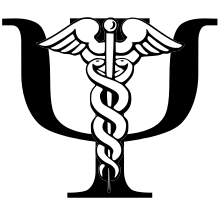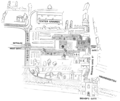Portal:Psychiatry
The Psychiatry Portal Psychiatry is the medical specialty devoted to the diagnosis, prevention, and treatment of deleterious mental conditions. These include various matters related to mood, behaviour, cognition, perceptions, and emotions. Initial psychiatric assessment of a person begins with creating a case history and conducting a mental status examination. Physical examinations, psychological tests, and laboratory tests may be conducted. On occasion, neuroimaging or other neurophysiological studies are performed. Mental disorders are diagnosed in accordance with diagnostic manuals such as the International Classification of Diseases (ICD), edited by the World Health Organization (WHO), and the Diagnostic and Statistical Manual of Mental Disorders (DSM), published by the American Psychiatric Association (APA). The fifth edition of the DSM (DSM-5), published in May 2013, reorganized the categories of disorders and added newer information and insights consistent with current research. Treatment may include psychotropics (psychiatric medicines) and psychotherapy, and also other modalities such as assertive community treatment, community reinforcement, substance-abuse treatment, and supported employment. Treatment may be delivered on an inpatient or outpatient basis, depending on the severity of functional impairment or risk to the individual or community. Research within psychiatry is conducted on an interdisciplinary basis with other professionals, such as epidemiologists, nurses, social workers, occupational therapists, and clinical psychologists. (Full article...) Selected article Tourette's was once considered a rare and bizarre syndrome, most often associated with the exclamation of obscene words or socially inappropriate and derogatory remarks (coprolalia), but this symptom is present in only a small minority of people with Tourette's. Tourette's is no longer considered a rare condition, but it is not always correctly identified because most cases are mild and the severity of tics decreases for most children as they pass through adolescence. Between 0.4% and 3.8% of children ages 5 to 18 may have Tourette's; the prevalence of other tic disorders in school-age children is higher, with the more common tics of eye blinking, coughing, throat clearing, sniffing, and facial movements. Extreme Tourette's in adulthood is a rarity, and Tourette's does not adversely affect intelligence or life expectancy. (Full article...) Selected image Advert from ca. 1962 for Thorazine (trade-name of chlorpromazine in the U.S.). An antipsychotic (neuroleptic, major tranquilizer, antischizophrenic, actaractic). In Europe it is known as Largactil. The text of the ad reads:
When the patient lashes out against "them" - THORAZINE (brand of chlorpromazine) quickly puts an end to his violent outburst. 'Thorazine' is especially effective when the psychotic episode is triggered by delusions or hallucinations. At the outset of treatment, Thorazine's combination of antipsychotic and sedative effects provides both emotional and physical calming. Assaultive or destructive behavior is rapidly controlled. As therapy continues, the initial sedative effect gradually disappears. But the antipsychotic effect continues, helping to dispel or modify delusions, hallucinations and confusion, while keeping the patient calm and approachable. SMITH KLINE AND FRENCH LABORATORIES leaders in psychopharmaceutical research. image credit: public domain
WikiProjectsSelected biographyAlfred W. Adler (February 7, 1870 – May 28, 1937) was an Austrian medical doctor, psychotherapist, and founder of the school of individual psychology. His emphasis on the importance of feelings of inferiority—the inferiority complex—is recognized as isolating an element which plays a key role in personality development. Alfred Adler considered human beings as an individual whole, therefore he called his psychology "Individual Psychology" (Orgler 1976). Adler was the first to emphasize the importance of the social element in the re-adjustment process of the individual and who carried psychiatry into the community. In collaboration with Sigmund Freud and a small group of Freud's colleagues, Adler was among the co-founders of the psychoanalytic movement and a core member of the Vienna Psychoanalytic Society: indeed, to Freud he was "the only personality there". He was the first major figure to break away from psychoanalysis to form an independent school of psychotherapy and personality theory, which he called individual psychology because he believed a human to be an indivisible whole, an individuum. He also imagined a person to be connected or associated with the surrounding world. (Full article...) General imagesThe following are images from various psychiatry-related articles on Wikipedia.
Related portalsTopicsSubcategoriesAssociated WikimediaThe following Wikimedia Foundation sister projects provide more on this subject:
Discover Wikipedia using portals |

































